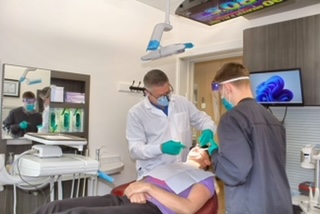How do I know when it is time to come in for a checkup?
We recommend that patients with good oral health schedule a checkup and hygiene visit twice each year. If you need more frequent visits, we’ll let you know. Checkups are important because, even if you don’t notice any pain or problems with your teeth, we may find signs of potential problems. For instance, demineralization is a precursor to decay, oral cancer often goes undetected until the later stages, and gum disease can be very stealthy. At your hygiene appointment we’ll clean plaque, tartar, and hardened food particles from your teeth. We’ll also make sure your gums are healthy and strong.
Who makes a good candidate for dental implants?
Most patients are implant candidates; however, a good candidate for dental implant has good oral health, adequate bone structure, and doesn’t smoke. The dentist will evaluate your unique case to determine if implants are right for you.
Does your office use lasers?
Our soft-tissue laser allows us to treat gum disease, contour tissue for crown placement, reduce gum tissue for esthetics, and do biopsies. You will need no stitches after laser surgery and bleeding is minimal. Most patients recover more quickly after laser surgery than they do following traditional surgery.
What is a digital X-ray, and how is it different from traditional X-rays?
When compared to traditional radiography, digital X-rays emit 80-percent less radiation. Detailed images are immediately available for view on a chair-side monitor in the operatory. We can transfer digital X-rays and photographs quickly via the internet to insurance companies and specialists as well. Digital X-rays require no hazardous developing chemicals, so they’re earth friendly!
How does gum disease affect the body?
It hides in your mouth, destroying gum tissue and teeth, and it can lead to strokes, heart attacks, and pregnancy complications. Don’t think it’s your problem? Conservative estimates report that up to 80% of the population unknowingly has gum disease in some form.
What Causes Periodontal Disease?
Periodontal diseases are caused by plaque (rhymes with “back”, a sticky film that is always forming on your teeth). Plaque contains bacteria that produce harmful toxins. If teeth are not cleaned well, the toxins irritate and inflame the gums.
Inflamed gums can pull away from the teeth and form spaces called pockets. The pockets trap plaque and bacteria which cannot be removed while brushing. The gums can become infected. If the infected pockets are not treated, the disease can get worse. The bone and other tissues that support teeth are then damaged.
Brush your teeth twice a day and floss (or use another between-the-teeth cleaner) daily. If plaque stays on the teeth, it can harden into a rough surface called tartar. Tartar can only be removed when teeth are cleaned at the dental office.


